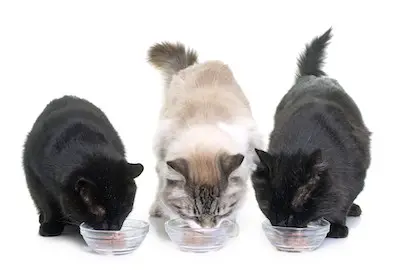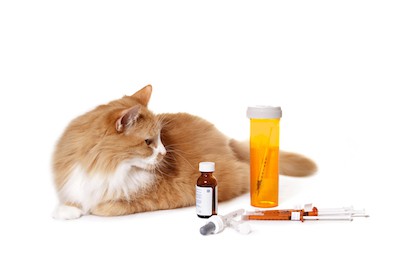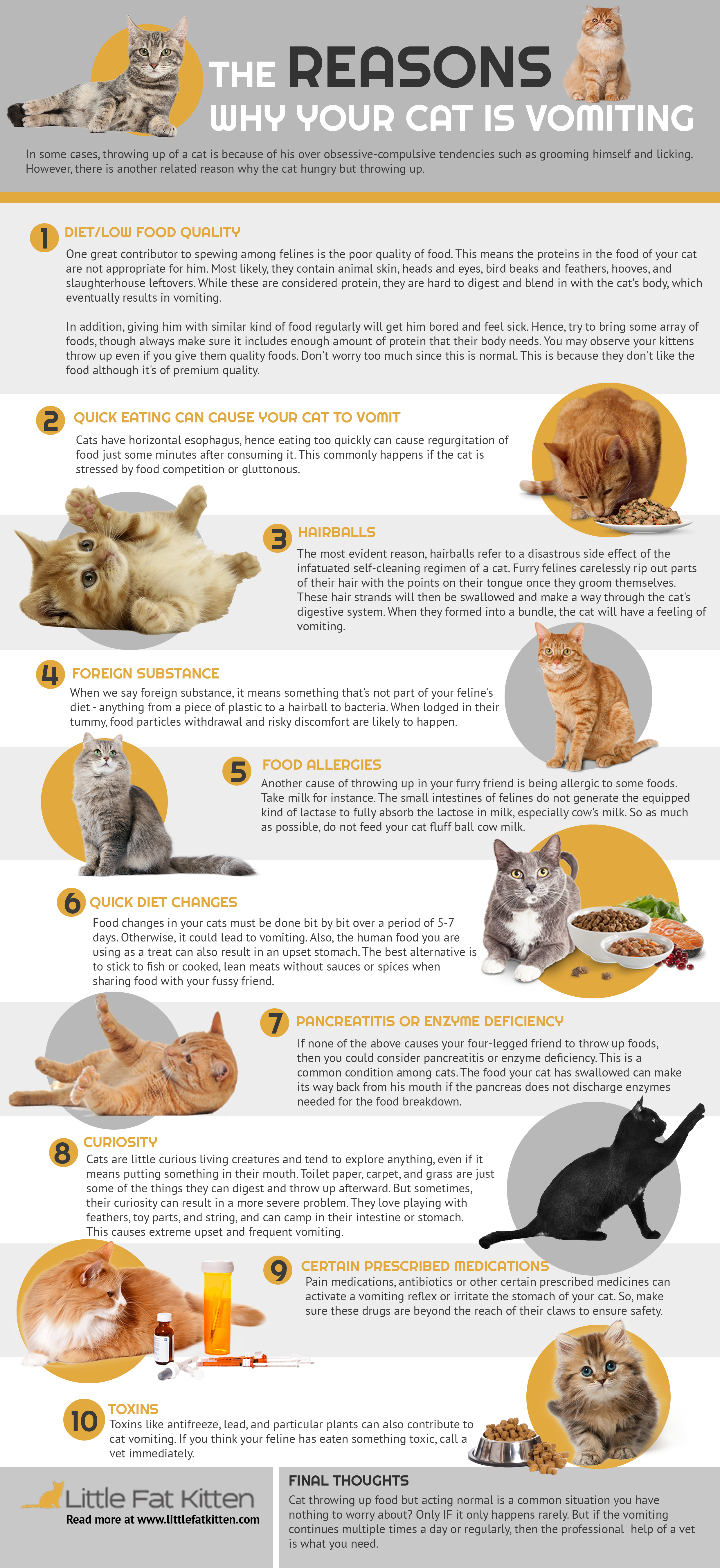Updated on
Is your cat throwing up but acting normal? Sometimes, vomiting among cats is pretty normal, but in some cases, it might be a serious issue. Vomiting can be a protective reaction caused by irritants or overindulgence, to a systematic disorder or a gastrointestinal disorder. What are possible reasons why your cat is vomiting? Let's find out!
Cat Vomiting - Is It Normal or A Concern?
Just like humans, cats can suffer from upset stomachs as well. If you have ever owned a feline, you’ve undoubtedly dealt with the awful feeling of being woken in the middle of the night by the sound of your cat spewing. Numerous conditions can cause vomiting, and the list is quite extensive. Some conditions include heart-worm, constipation, hairballs, poor cat food, and any other conditions.
Seeing your cat vomit can be distressing, and you want to do any possible solutions to help them recover quickly. If he looks otherwise healthy, has a good appetite towards normal foods and drinks, has not lost weight, has normal behavior and activity levels, and the vomiting only happens seldomly- then there's nothing you need to worry about.
Contents
When to Call for Help?
If you notice the cat vomiting several times a day, then you should contact your veterinarian immediately. The best thing to do is keep on observing your feline thoroughly. Look carefully for other changes occurring, such as:
- Continued throwing up (happens numerous times in a day or continues for over one day)
- Lethargy or weakness
- Not keeping down any meals
- Some blood in the vomit
- Change in appetite, drinking pattern, and toilet pattern
- Any grooming changes
- Other signs of change in behavior or ill health
If one or some of these warning signs occur, it's best to take your pet to the vet. Usually, the vet will ask a very comprehensive clinical background and do a thorough physical examination. The information she will get will help her narrow down possible causes from the extensive list of possibilities.
Your vet may have to conduct further assessment of cat vomiting, depending on the reaction. These additional tests may include fecal examination, blood tests, and urine analysis (depending on history, trial therapy response, and clinical evaluation). Treatment depends on the fundamental cause.
The Reasons Why Your Cat Is Vomiting
In some cases, vomiting is caused by over obsessive-compulsive tendencies such as grooming himself and licking. These over grooming behaviors can produce hairballs. However, there are many other related reasons why the cat is hungry but throwing up.
Diet/Low Food Quality


One contributor to regurgitation among felines is the poor quality of food. This means the proteins in the food of your cat are not appropriate for him. While byproducts are considered protein, they are hard to digest and blend in with the cat's body, which eventually results in vomiting. Taurine is one of the essential amino acids cats require in their diets. Not having it, or not the right amount, can result in digestive issues, among many other health issues. Taurine is added to all commercial cat diets.
In addition, giving him similar kinds of food regularly can become bored and feel sick. Try to bring some array of foods, though always make sure it includes enough protein that their body needs. You may observe your kittens throw up even if you give them quality foods. Don't worry too much since this is normal. This is because they don't like the food although it's of premium quality.
Quick Eating Can Cause Your Cat to Vomit
Cats have a horizontal esophagus. Eating too quickly can cause regurgitation of food just minutes after consuming it. This commonly happens if the cat is stressed by food competition or is gluttonous. Slow feeder bowls have channels or pegs that make the cat work around them to get their food. This causes them to slow down when eating so they can digest their food.
Hairballs
One of the most common reasons for vomiting are hairballs. Hairballs refer to a side effect of the infatuated self-cleaning regimen of a cat. Felines have rough tongues which pulls hair out as they groom themselves. These hair strands will then be swallowed and make a way through the cat's digestive system. When they form into a bundle, the cat will have an urge to vomit.
Foreign Substance
A foreign substance is anything that's not part of your feline's diet - anything from a piece of plastic to a hairball to bacteria. When lodged in the stomach, food particles withdrawal and discomfort leading to vomiting is likely to happen.
Food Allergies
Cats can have allergies just like people. Another cause of throwing up in your furry friend is being allergic to some foods. Take milk for example, many cats have a level of milk intolerance. The feline small intestines do not generate the equipped kind of lactase to fully absorb the lactose in milk, especially cow's milk. It is not recommended to feed kittens cow milk.
Quick Diet Changes
Food changes in your cats must be done in slow increments over a period of 5-7 days. Otherwise, it could lead to vomiting. Most food brands have recommendations of transitioning your cat to the new diet. Also, if you are using human food you are using as a treat, that can also result in an upset stomach. The best alternative is to stick to fish or cooked, lean meats without sauces or spices when sharing food with your feline friend.
Pancreatitis or Enzyme Deficiency
If none of the above causes your four-legged friend to throw up foods, then you could consider pancreatitis or enzyme deficiency. This is a common condition among cats. The food your cat has swallowed can make its way back from his mouth if the pancreas does not discharge enzymes needed for the food breakdown.
Curiosity
Cats are curious creatures and tend to explore anything, even if it means putting something in their mouth. Toilet paper, carpet, and grass are just some of the things they can digest and throw up afterward. Sometimes, their curiosity can result in a more severe problem. They love playing with feathers, toy parts, and string, which can camp in their intestines or stomach if ingested. This causes extreme upset and frequent vomiting.
Certain Prescribed Medications


Pain medications, antibiotics or other certain prescribed medicines can activate a vomiting reflex or irritate the stomach of your cat. So, make sure these drugs are beyond the reach of their claws to ensure safety.
Toxins
Toxins like antifreeze, lead, and particular plants can also contribute to cat vomiting. If you think your feline has eaten something toxic, call your regular vet or emergency vet hospital immediately.
Be Observant!
Even if your feline friend is still enthusiastic, playful, and active, but throws up regularly, it would be sensible to consult a veterinarian. Frequent vomiting can lead to dehydration and malnutrition in the long run.
If preventing weight loss with your cat is your goal, then you should act straight away. Mix in some water with his food to keep him hydrated and decrease his meal sizes to reduce having an upset stomach.
Final Thoughts
Is your cat is throwing up food but acting normal a common situation you have nothing to worry about? Only IF it only happens rarely. But, if the vomiting continues multiple times a day or regularly, then seek the professional help of your regular veterinarian.
Now that you might have narrowed down the cause of vomiting, you still have to deal with the clean up. It’s best to have paper towels or rags and a cleaner or disinfectant on hand for quick cleanup. There are many pet safe enzymatic cleaners available to remove stains and odors caused by vomiting. These work to dissolve the residue on your carpet or floor. Simply spray and wipe! Vinegar and water or baking soda are common household solutions for removing vomit and odors.
